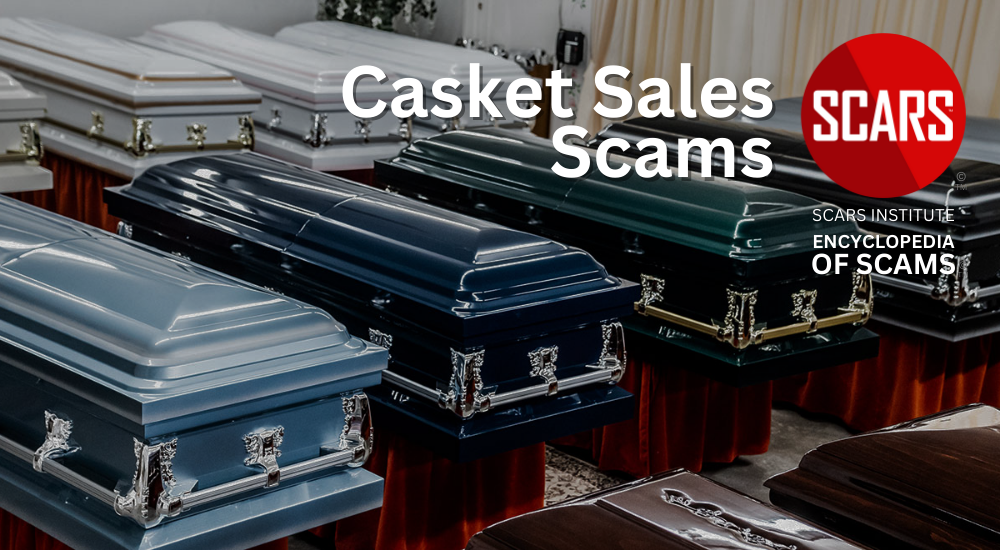
SCARS Institute’s Encyclopedia of Scams™ Published Continuously for 25 Years

Funeral Home Scams
Funeral Home Scam Preys on Grieving Families: A New Low in Fraud
How Scams Work – A SCARS Institute Insight
Author:
• SCARS Institute Encyclopedia of Scams Editorial Team – Society of Citizens Against Relationship Scams Inc.
Article Abstract
Scammers have reached new lows by impersonating funeral home staff, targeting families in mourning. These fraudsters claim that unless immediate payment is made, the funeral will be canceled, exploiting the emotional vulnerability of grieving individuals.
The urgency they create pressures victims into paying through untraceable methods like wire transfers or gift cards. Funeral homes can combat this by educating families and ensuring clear communication about fees, while individuals are encouraged to verify any payment requests and stay vigilant against such schemes.

Funeral Home Scam Preys on Grieving Families: A New Low in Fraud
In a heart-wrenching scheme, scammers are now targeting families in mourning by impersonating funeral home staff. These criminals contact grieving families, claiming they need immediate payments or the planned funeral service will be canceled. This exploitative scam preys on the emotional vulnerability of those dealing with the recent loss of a loved one, making it one of the most despicable fraud tactics seen today.
How the Scam Works
The scam begins when fraudsters contact families by phone or email, pretending to be representatives from a funeral home. They often claim there was an unexpected fee or issue with the services that must be resolved immediately. The urgency in their tone pressures families into thinking that their loved one’s funeral will be disrupted unless payment is made right away. These scammers often request wire transfers, gift cards, or other hard-to-trace payment methods, making it nearly impossible to recover the funds once sent.
Targeting Vulnerable Families
The grief and emotional strain families endure during this time make them especially susceptible to such deception. When in mourning, people are often distracted, overwhelmed, and emotionally fragile, which reduces their ability to question or recognize the scam. This adds to the psychological impact of the fraud, leaving victims not only financially strained but also deeply disturbed by the exploitation of their most vulnerable moments.
The Ethical Outrage
There’s a particular horror in the fact that scammers are targeting grieving individuals—people already experiencing some of the most difficult moments of their lives. Preying on the mourning process for financial gain highlights the shameless and ruthless tactics of modern fraudsters. This is why raising awareness within the funeral industry and among communities is crucial to stopping these scams before they can further victimize grieving families.
How Funeral Homes and Communities Can Help
Funeral homes should be proactive in warning their clients about this type of scam. Educating families about the possibility of fraudulent calls or emails and providing clear communication about fees and procedures can help reduce confusion and susceptibility to scams. Additionally, employees should be trained to recognize and report suspicious activities related to payments and client communications.
Families should also be encouraged to verify any unexpected fees directly with the funeral home before making any payments. Scammers often create a sense of urgency to prevent their targets from double-checking information. By taking the time to call the funeral home using a known, trusted number, families can protect themselves from falling into this trap.
How to Protect Yourself
- Verify All Requests for Payment: If you’re asked for additional funds, call the funeral home directly using their official contact details, not the number provided by the scammer.
- Be Skeptical of Urgent Requests: Scammers often pressure victims into making hasty decisions. Funeral homes do not typically demand immediate payments with the threat of canceling services.
- Report Suspicious Activity: Notify local authorities or consumer protection agencies if you suspect a scam. In the U.S., this can be done through the Federal Trade Commission (FTC).
- Stay Informed: Funeral homes should share these warnings with families and display them prominently on their websites or in service agreements.
Conclusion
Funeral home scams are a despicable exploitation of people during their most vulnerable moments. By staying vigilant and encouraging awareness within the funeral industry and affected communities, we can help prevent these criminals from preying on grieving families. Education, transparency, and verification are key defenses against these heartless schemes.
-/ 30 /-
What do you think about this?
Please share your thoughts in a comment below!
Table of Contents
LEAVE A COMMENT?
Recent Comments
On Other Articles
- velma faile on Finally Tax Relief for American Scam Victims is on the Horizon – 2026: “I just did my taxes for 2025 my tax account said so far for romances scam we cd not take…” Feb 25, 19:50
- on Reporting Scams & Interacting With The Police – A Scam Victim’s Checklist [VIDEO]: “Yes, this is a scam. For your own sanity, just block them completely.” Feb 25, 15:37
- on Danielle Delaunay/Danielle Genevieve – Stolen Identity/Stolen Photos – Impersonation Victim UPDATED 2024: “She goes by the name of Sanrda John now” Feb 25, 10:26
- on Reporting Scams & Interacting With The Police – A Scam Victim’s Checklist [VIDEO]: “So far I have not been scam out of any money because I was aware not to give the money…” Feb 25, 07:46
- on Love Bombing And How Romance Scam Victims Are Forced To Feel: “I was love bombed to the point that I would do just about anything for the scammer(s). I was told…” Feb 11, 14:24
- on Dani Daniels (Kira Lee Orsag): Another Scammer’s Favorite: “You provide a valuable service! I wish more people knew about it!” Feb 10, 15:05
- on Danielle Delaunay/Danielle Genevieve – Stolen Identity/Stolen Photos – Impersonation Victim UPDATED 2024: “We highly recommend that you simply turn away form the scam and scammers, and focus on the development of a…” Feb 4, 19:47
- on The Art Of Deception: The Fundamental Principals Of Successful Deceptions – 2024: “I experienced many of the deceptive tactics that romance scammers use. I was told various stories of hardship and why…” Feb 4, 15:27
- on Danielle Delaunay/Danielle Genevieve – Stolen Identity/Stolen Photos – Impersonation Victim UPDATED 2024: “Yes, I’m in that exact situation also. “Danielle” has seriously scammed me for 3 years now. “She” (he) doesn’t know…” Feb 4, 14:58
- on An Essay on Justice and Money Recovery – 2026: “you are so right I accidentally clicked on online justice I signed an agreement for 12k upfront but cd only…” Feb 3, 08:16
ARTICLE META
Important Information for New Scam Victims
- Please visit www.ScamVictimsSupport.org – a SCARS Website for New Scam Victims & Sextortion Victims
- Enroll in FREE SCARS Scam Survivor’s School now at www.SCARSeducation.org
- Please visit www.ScamPsychology.org – to more fully understand the psychological concepts involved in scams and scam victim recovery
If you are looking for local trauma counselors please visit counseling.AgainstScams.org or join SCARS for our counseling/therapy benefit: membership.AgainstScams.org
If you need to speak with someone now, you can dial 988 or find phone numbers for crisis hotlines all around the world here: www.opencounseling.com/suicide-hotlines
A Note About Labeling!
We often use the term ‘scam victim’ in our articles, but this is a convenience to help those searching for information in search engines like Google. It is just a convenience and has no deeper meaning. If you have come through such an experience, YOU are a Survivor! It was not your fault. You are not alone! Axios!
A Question of Trust
At the SCARS Institute, we invite you to do your own research on the topics we speak about and publish, Our team investigates the subject being discussed, especially when it comes to understanding the scam victims-survivors experience. You can do Google searches but in many cases, you will have to wade through scientific papers and studies. However, remember that biases and perspectives matter and influence the outcome. Regardless, we encourage you to explore these topics as thoroughly as you can for your own awareness.
Statement About Victim Blaming
SCARS Institute articles examine different aspects of the scam victim experience, as well as those who may have been secondary victims. This work focuses on understanding victimization through the science of victimology, including common psychological and behavioral responses. The purpose is to help victims and survivors understand why these crimes occurred, reduce shame and self-blame, strengthen recovery programs and victim opportunities, and lower the risk of future victimization.
At times, these discussions may sound uncomfortable, overwhelming, or may be mistaken for blame. They are not. Scam victims are never blamed. Our goal is to explain the mechanisms of deception and the human responses that scammers exploit, and the processes that occur after the scam ends, so victims can better understand what happened to them and why it felt convincing at the time, and what the path looks like going forward.
Articles that address the psychology, neurology, physiology, and other characteristics of scams and the victim experience recognize that all people share cognitive and emotional traits that can be manipulated under the right conditions. These characteristics are not flaws. They are normal human functions that criminals deliberately exploit. Victims typically have little awareness of these mechanisms while a scam is unfolding and a very limited ability to control them. Awareness often comes only after the harm has occurred.
By explaining these processes, these articles help victims make sense of their experiences, understand common post-scam reactions, and identify ways to protect themselves moving forward. This knowledge supports recovery by replacing confusion and self-blame with clarity, context, and self-compassion.
Additional educational material on these topics is available at ScamPsychology.org – ScamsNOW.com and other SCARS Institute websites.
Psychology Disclaimer:
All articles about psychology and the human brain on this website are for information & education only
The information provided in this article is intended for educational and self-help purposes only and should not be construed as a substitute for professional therapy or counseling.
While any self-help techniques outlined herein may be beneficial for scam victims seeking to recover from their experience and move towards recovery, it is important to consult with a qualified mental health professional before initiating any course of action. Each individual’s experience and needs are unique, and what works for one person may not be suitable for another.
Additionally, any approach may not be appropriate for individuals with certain pre-existing mental health conditions or trauma histories. It is advisable to seek guidance from a licensed therapist or counselor who can provide personalized support, guidance, and treatment tailored to your specific needs.
If you are experiencing significant distress or emotional difficulties related to a scam or other traumatic event, please consult your doctor or mental health provider for appropriate care and support.
Also read our SCARS Institute Statement about Professional Care for Scam Victims – click here to go to our ScamsNOW.com website.
















Thank you for your comment. You may receive an email to follow up. We never share your data with marketers.